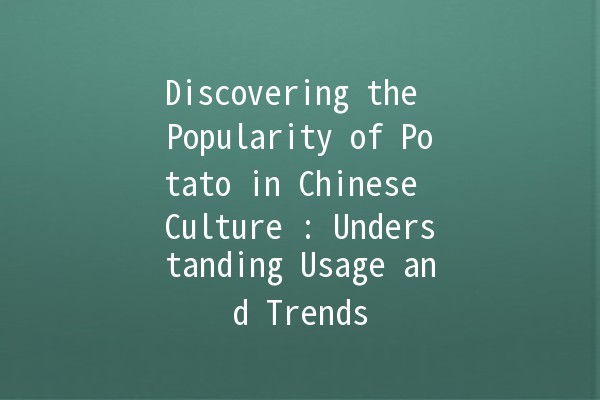In the realm of language and culture, few things are as fascinating as the evolution of a word and its usage across different regions. In this article, we will delve into the usage of the term "potato" in the Chinese language, exploring its popularity, significance, and the broader cultural implications it carries. This analysis aims to not only inform but also engage readers with insights and practical tips on how to effectively utilize this term within various contexts.
to "Potato" in Chinese
The word "potato" in Chinese is translated as "土豆" (tǔdòu). This simple yet versatile term encapsulates more than just a common vegetable; it embodies a rich tapestry of cultural significance and linguistic diversity. While potatoes are celebrated as a staple food in many countries, their unique place within Chinese culinary practices offers a glimpse into local traditions and cuisine.
The Popularity of "Potato"
In Chinese cooking, potatoes are not just used as a side dish; they are integrated into a wide array of recipes. From stirfries to stews, the adaptability of potatoes makes them a beloved ingredient. For instance, you might encounter dishes such as "土豆丝" (shredded potatoes) or "土豆炖牛肉" (potato and beef stew), both of which highlight the versatility of this ingredient.

Beyond the kitchen, "土豆" also holds cultural weight. In contemporary slang, the term has evolved to convey various meanings within social contexts. It symbolizes comfort, homeliness, and even a playful attitude, particularly among younger generations who use it in memes and casual conversations.
With the rise of social media and online communities, the term "potato" has transcended culinary boundaries, finding a place in digital conversations. Platforms like WeChat and Weibo have seen the emergence of potatothemed memes and hashtags, contributing to its popularity among the youth.
Exploring Usage Trends
Understanding the usage of "potato" in Chinese contexts requires examining its frequency and variations in different settings.
The phrase "土豆" is commonly used in everyday conversations. When discussing food preferences or meal preparations, mentioning potatoes is almost inevitable.
> Example: "你今天晚上想吃什么?我可以做土豆跟肉!"
> (What do you want to eat tonight? I can make potatoes with meat!)
In educational settings, especially language classes, "potato" serves as an excellent vocabulary word for beginners. It introduces students to foodrelated nouns while also allowing them to practice sentence structure and pronunciation.
> Example: "我最喜欢的蔬菜是土豆。"
> (My favorite vegetable is potato.)
Potatoes frequently appear in Chinese pop culture as symbols of humor. Certain phrases or memes use "土豆" to express a relaxed attitude or to joke about one's appearance.
> Example: "我今天的造型就像个土豆。"
> (My look today is like a potato.)
To further enhance our understanding of "potato" in the Chinese language, here are five practical tips for effectively integrating it into your conversations and written communication.
Tips for Using "Potato" in Chinese Conversations
Using "土豆" in recipes or food discussions can elevate your conversational skills. Practice describing dishes that include potatoes and share your culinary experiences with friends.
Example Application:
> When asked about your favorite dish, respond with:
> "我非常喜欢土豆焖鸡,这道菜超级美味!"
> (I really love chicken braised with potatoes; it’s super delicious!)
Don’t shy away from incorporating "土豆" into everyday chat, especially among friends. This can serve as an icebreaker or a humorous touch.
Example Application:
> If someone complains about their appearance, you could lightly say:
> "不要担心,你今天看起来像个可爱的土豆!"
> (Don’t worry, you look like a cute potato today!)
Stay updated with trending memes or phrases that feature "土豆" on Chinese social media. Engaging with these trends can help you connect with younger audiences.
Example Application:
> Participate in online challenges or use the term in comments, like:
> "我也想当一个土豆!"
> (I also want to be a potato!)
If you’re a content creator, consider developing posts or videos that creatively incorporate "土豆." This can resonate well with your audience.
Example Application:
> Develop a cooking video titled “5个最好的土豆食谱” (5 Best Potato Recipes) and share it online.
Join language exchange groups where you can practice using "土豆" in diverse situations while learning from native speakers. This enhances your vocabulary and contextual understanding.
Example Application:
> During an exchange session, share:
> "我昨天做了土豆沙拉,大家都赞不绝口!"
> (I made potato salad yesterday, and everyone loved it!)
Common Questions About "Potato" Usage in Chinese
The standard term is "土豆" (tǔdòu), but some regional variations include "薯仔" (shǔzǎi) in Cantonese. Understanding these nuances can be valuable when conversing with speakers from different regions.
The lighthearted nature of the term "土豆" allows for playful banter and humor, making it particularly appealing among the youth. They enjoy using it in relatable social contexts and memes.
Focus on learning associated culinary terms, phrases, and idiomatic expressions. Practice using them in sentences or find cooking blogs that feature potatoes to broaden your contextual usage.
Yes, several Chinese TV shows and online content feature "土豆" as part of the humor or storytelling, showcasing its cultural significance beyond food.
While largely positive, "土豆" can carry negative undertones when used to describe someone as lazy or unattractive. Always be mindful of tone and context.
Given China’s diverse culinary landscape, potatoes appear in various forms across regions. For instance, in Xinjiang, they are often used in kebabs, while in Sichuan, they may feature in spicy stirfried dishes.
In summary, the term "potato" in Chinese culture extends far beyond its culinary applications. By understanding its usage, cultural implications, and engaging with various contexts, individuals can enrich their language skills and create meaningful interactions. Whether through culinary creations or social commentary, embracing the word "土豆" represents a delightful journey into cultural exploration.
By staying curious and connected to language trends, you’ll find endless opportunities to engage with this quirky yet significant term in your Chinese language journey!